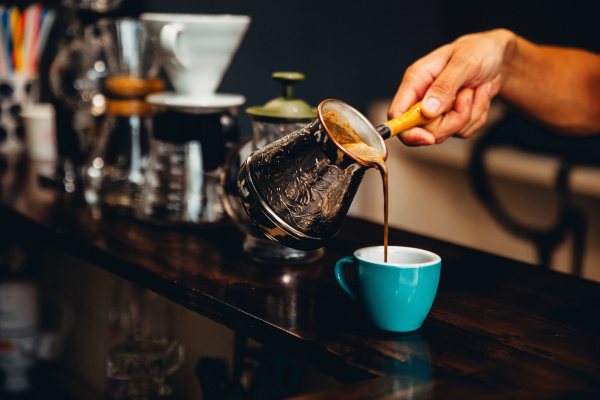You’ve picked the perfect beans, ground them to the ideal consistency, and mastered your brewing technique — but your coffee still tastes dull after a few days. The reason might not be your method. It could be how you store your coffee.
Proper coffee storage is essential for maintaining flavor, aroma, and freshness. Coffee is sensitive to air, moisture, light, and heat — and even small mistakes in storage can ruin a good batch.
In this article, you’ll learn how to store coffee correctly, what to avoid, and the best containers and environments to make your coffee last longer.
Why Coffee Loses Freshness
Coffee is a natural product and begins to degrade shortly after roasting. The key enemies of fresh coffee are:
- Oxygen: Causes oxidation, which dulls flavor
- Moisture: Promotes mold and ruins texture
- Heat: Speeds up the aging process
- Light: Breaks down aromatic oils and flavor compounds
These elements work together to strip your coffee of its character. That’s why proper storage makes all the difference.
Whole Beans vs. Ground Coffee: Which Lasts Longer?
Whole coffee beans last significantly longer than ground coffee because they have less surface area exposed to air. Once ground, coffee begins to lose its aroma and flavor within minutes.
Shelf Life (Approximate):
- Whole beans: Up to 4 weeks after roasting (stored properly)
- Ground coffee: Best within a few days to a week after grinding
Pro tip: Always buy whole beans and grind them just before brewing.
Best Practices to Store Coffee
To extend the life and flavor of your coffee, follow these golden rules:
1. Use an Airtight Container
The first and most important step is sealing your coffee away from oxygen.
Best containers:
- Opaque, airtight canisters (like stainless steel or ceramic)
- Vacuum-sealed coffee containers
- One-way valve coffee bags (often used by specialty roasters)
Avoid clear jars or containers with loose-fitting lids — they won’t keep air out.
2. Store in a Cool, Dark Place
Light and heat speed up the aging process of coffee.
Ideal storage spots:
- Kitchen cabinet or pantry (away from the stove and sunlight)
- A drawer or cupboard that doesn’t heat up during the day
Do not store coffee on your counter if it gets direct sun or sits near heat-producing appliances.
3. Avoid the Fridge and Freezer (In Most Cases)
Many people assume the fridge or freezer will keep coffee fresh. In reality, they often do more harm than good.
Why avoid them?
- Coffee is porous and can absorb moisture and odors
- Constant opening and closing leads to condensation
- Fluctuating temperatures degrade flavor
Exceptions:
If you’ve bought coffee in bulk and want to store unopened bags, you can freeze them. But once opened, coffee should stay in a controlled, dry environment.
How to Store Ground Coffee (If You Must)
While whole beans are always better, if you must store ground coffee:
- Keep it in a small, airtight container
- Store it in a cool, dark cabinet
- Use it within 3 to 7 days of grinding for best flavor
- Avoid grinding large amounts ahead of time
The more air and time ground coffee is exposed to, the flatter it will taste.
Buying Smart: Only What You Need
One of the easiest ways to keep coffee fresh is to buy smaller amounts more often. Here’s how:
- Buy weekly or bi-weekly instead of monthly
- Purchase from local roasters with visible roast dates
- Avoid bulk deals unless you have proper long-term storage
Fresh coffee is better than a big bag of stale coffee — no matter how good the deal.
Travel or Office Tip: Use Coffee Tubes or Canisters
If you take your coffee to work or travel frequently, use mini airtight canisters. They keep a small dose fresh for a few days and prevent you from exposing your whole batch to air every time you open the main container.
Some popular options include:
- Stainless steel mini vacuum canisters
- Glass jars with rubber seals (if kept away from light)
- Reusable travel coffee pods (for espresso machines)
Quick Do’s and Don’ts of Coffee Storage
DO:
- Use an airtight, opaque container
- Keep coffee away from light, heat, and moisture
- Buy freshly roasted beans in small amounts
- Store in a pantry or cabinet
DON’T:
- Leave beans in the original open bag
- Use clear containers in bright kitchens
- Store coffee near the stove, oven, or window
- Freeze or refrigerate daily-use coffee
Final Thoughts: Fresh Coffee Starts with Smart Storage
Making great coffee isn’t just about brewing — it starts with how you store your coffee. By protecting your beans from air, moisture, light, and heat, you preserve their natural oils, aroma, and flavor for as long as possible.
The difference is noticeable in every sip. With the right habits and a few storage tools, your coffee will stay fresher — and taste better — for much longer.

